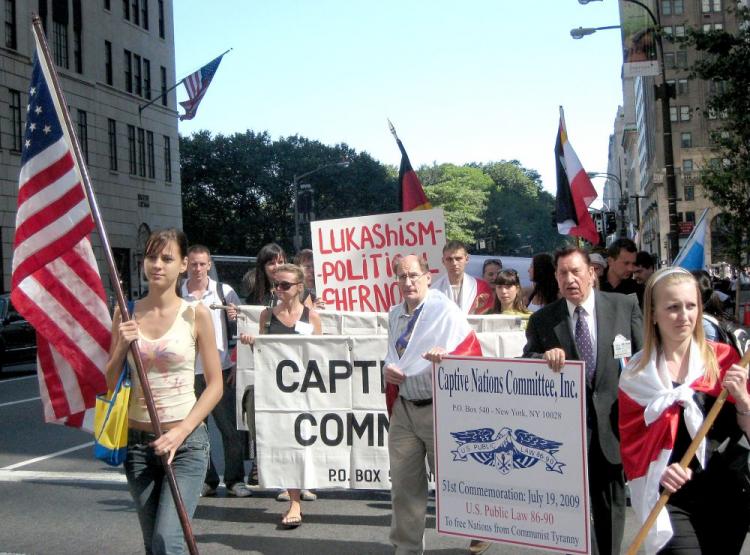NEW YORK—The 51st annual Captive Nations Week kicked off with a procession of representatives from many countries in front of the Plaza Hotel on Sunday.
A procession of about 20-strong marched down 5th Avenue, carrying signs condemning oppression under communism in the form of unfair division of land and the lack of freedom in nations still influenced by communism.
Captive Nations refer to countries ruled by a communist regime or under the influence of communism and includes countries such as Vietnam, Germany, China, and Belarus.
Captive Nations motto is “To remember the over 140 million mass-murdered by the Communist Party International,” Honorary and Acting President of the Captive Nations Committee, Inc. Horst A. Uhlich said in his opening address.
Uhlich said that the state of freedoms in China is a “tragedy today.” “People don’t do much,” he said, adding that since many Taiwanese who live in Democratic Taiwan have economic enterprises in Beijing, they are reluctant to do much concerning the lack human rights.
Hartmut Parsiegla, a delegate of Prussian United from Germany, said that even in modern day Germany, after the collapse of the Berlin Wall and the communist government in East Germany, there is “No freedom of speech, no freedom of press.”
If someone expresses opinions against the government’s ideology, he or she is subject to house searches, as well as monetary and legal charges, said Parsiegla. “Newspapers [in Germany] are not in-depth enough,” he said.
Viktar Yedzinovich, a scientist from Belarus who was part of the procession, was beaten when he spoke his native language, Belarussian—in his country, rather than Russian, as requested by the government.
“The Republic of Belarus gets pressure from Russia,” said Marina Davidziuk, wrapped in a flag of Belarus and hoisting the stars and stripes. “The American flag is a symbol of independence and freedom,” she said.
Captive Nations Week—the third week of July—was signed into law in 1959 by President Eisenhower. Since then, Captive Nations has received proclamations from presidents, governors, and other government officials, such as President Bush in 2008, Alabama Governor Bob Riley, and Mayor Michael Bloomberg, said secretary for the Captive Nations Committee Inc. Jaan Kuum.
Kuum explained that communist states still exist today because “dictators use fear as a means to control” and that the governments don’t allow multi-party elections.



